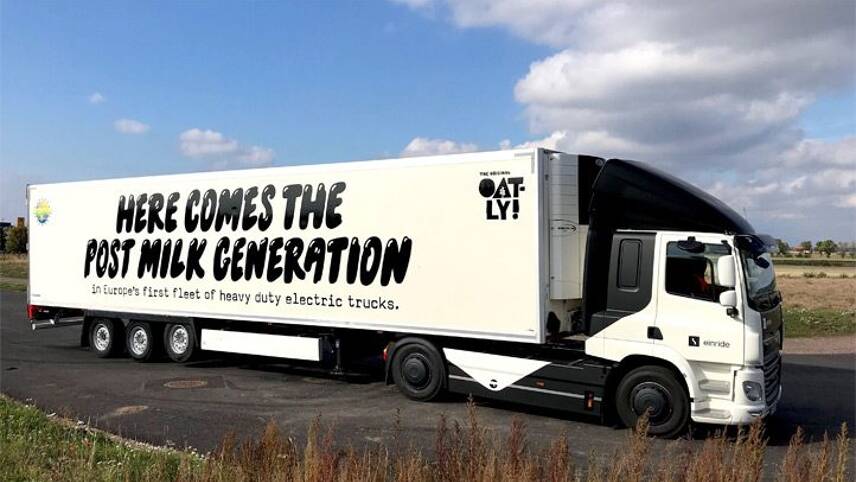Register for free and continue reading
Join our growing army of changemakers and get unlimited access to our premium content

The electric trucks have so far covered more than 8
Oatly entered into a partnership with Einride earlier in the year, with the first electric trucks deployed from the food brand’s productions warehouses in the Swedish cities of Helsingborg, Landskrona, and Småland’s Tingsryd, last month.
The electric trucks have so far covered more than 8,600km in delivery routes, achieving CO2 savings of more than 10,500kg. Compared to traditional diesel trucks, the electric variants have reduced Oatly’s carbon footprint by 87% across those routes.
Oatly’s supply chain director Simon Broadbent said: “Sustainability is at the core of everything we do, and we work hard to lower our emissions across the board. This includes our emissions for transports, which is why we are now shifting to electrical vehicles, which reduces our climate footprint by 87% on these routes.
“Together with Einride, we are helping drive a needed change in the transportation industry in showing that new, innovative solutions can actually be implemented.”
Einride’s intelligent freight mobility platform oversees route optimisation and truck efficiency and drivers are provided by Erikssons Åkeri AB, a carrier partner of Einride since July.
Sour taste
It hasn’t been all good news for the Oatly brand, despite the souring demands for plant-based food alternatives due to their lower environmental footprints.
In September, Oatly was criticised for a decision to sell a stake in the company, in a deal that values Oatly at around $2bn. Investors such as Natalie Portman and former Starbucks chief Howard Schultz were involved in a $200m agreement, but so was the Blackstone consortium.
As referenced by the Guardian, Blackstone is headed by Trump donor Stephen Schwartzman and has links to infrastructure projects that have been accused of causing deforestation in Brazil’s Amazon region
A Twitter thread has linked Blackstone to cases of deforestation, an accusation that Blackstone has denied. In a statement, the consortium said: “The erroneous claims and mischaracterisations were blatantly wrong and irresponsible.”
Oatly’s own response to the controversy notes that the decision an “investment choice that makes for sensational headlines in a world where debates have become so dangerously black and white”.
The food brand believes that getting one of the world’s largest private equity firms and delivering profitability through sustainability for them, will get others in the finance sector to focus more on sustainable business models and corporations.
“Our bet is that when Blackstone’s investment in our oat-based sustainability movement brings them larger returns than they would have been able to get elsewhere (like, say, from the meat and dairy industry which are one of the major causes of the deforestation in the Amazon today) a powerful message will be sent to the global private equity markets, one written in the only language our critics claim they will listen to: profit,” Oatly said in a statement.
Matt Mace


This is where the world should be focussing its efforts on low emission vehicles, distribution. Not private motoring which is still focussed on the 50,000 plus luxury SUV sector.
Delivery vehicles do far more miles per annum than the average private motorist and are almost entirely diesel powered.